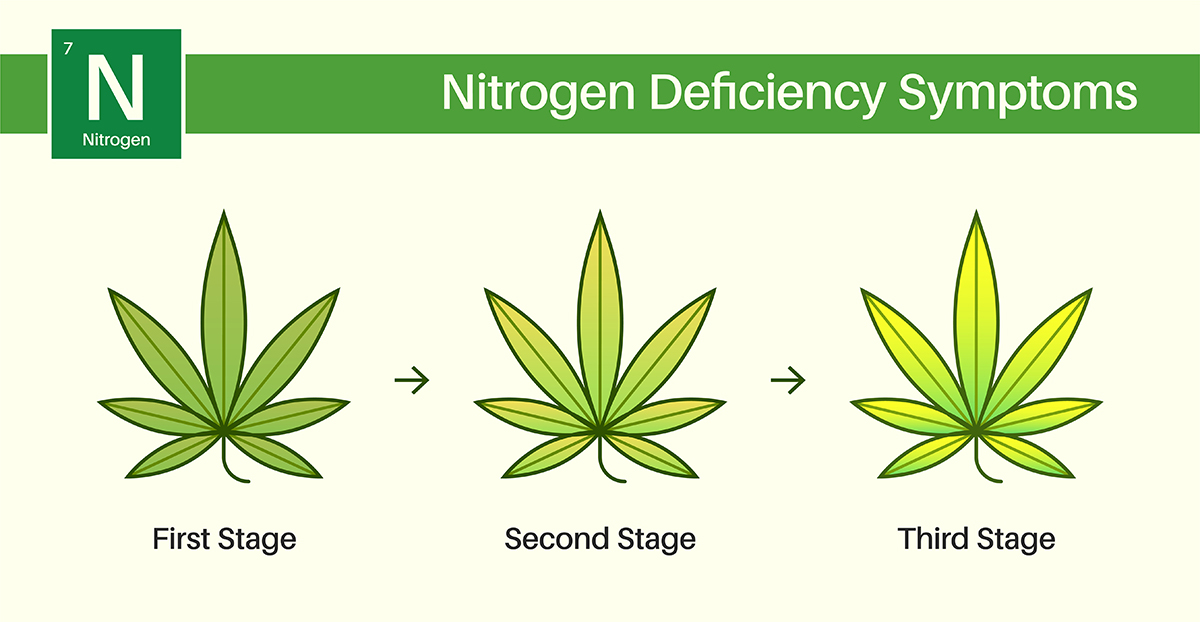How to Fix Nitrogen Deficiency in Cannabis?
Fortunately, nitrogen deficiency can be easily addressed if caught early. Here are some tips to help fix nitrogen deficiency and promote healthier cannabis plants:
- Use Nitrogen-Rich Fertilizers: One of the most effective ways to address nitrogen deficiency is to use a nitrogen-rich fertilizer. Fertilizers formulated specifically for cannabis plants are widely available, providing a balance of nitrogen, phosphorus, and potassium. Look for a fertilizer that has a higher first number (NPK ratio), indicating that it is high in nitrogen.
- Incorporate Organic Matter: Adding organic matter such as compost, manure, or cover crops can help improve the nitrogen levels in your soil. Organic matter decomposes slowly, releasing nitrogen over time and enhancing soil structure for better root development and nutrient uptake.
- Adjust pH Levels: If the pH levels of your soil or nutrient solution are off, you may need to adjust them. This will ensure that your cannabis plants can efficiently absorb nitrogen and other essential nutrients. For soil-based grows, aim for a pH between 6.0 and 7.0, and for hydroponic systems, keep the pH between 5.5 and 6.5.
- Top-Dress with Compost or Worm Castings: Adding a layer of compost or worm castings around the base of your plants can help replenish nitrogen levels. These organic materials provide not only a slow-release source of nitrogen but also improve soil health and moisture retention.
- Supplement with Liquid Nitrogen Fertilizer: If you need to address nitrogen deficiency quickly, using a liquid nitrogen fertilizer can provide an immediate boost. These are readily absorbed by plants, making them ideal for fast results.
- Reduce Overuse of Phosphorus and Potassium: While phosphorus and potassium are crucial for plant development, using too much of them can create nutrient imbalances. If you suspect that overuse of these nutrients has interfered with nitrogen uptake, adjust the nutrient mix accordingly.
- Monitor Watering Practices: Ensure you’re watering your plants properly. Avoid overwatering and ensure the soil has good drainage. Cannabis roots require both water and oxygen to absorb nutrients efficiently, so proper irrigation practices are essential.
- Use Dosatron Metering Pumps for Precision Fertigation: If you're growing cannabis in a hydroponic system or using a fertigation setup, Dosatron metering pumps can be an invaluable tool to fix nitrogen deficiency.
Dosatron pumps precisely mix water with liquid fertilizers, ensuring the correct amounts of nitrogen (and other nutrients) are consistently delivered to the plants. This method ensures nitrogen in the soil is maintained at optimal levels, preventing over or underfeeding.
With Dosatron’s accuracy, you can ensure that your plants are receiving the exact amounts of nitrogen needed, which is especially important when managing nutrient imbalances. By integrating Dosatron pumps into your fertigation system, you can streamline nutrient delivery, minimize waste, and improve plant health.
By using the right fertilizers, adjusting pH levels, incorporating organic matter, monitoring watering practices, and incorporating tools like Dosatron metering pumps, you can effectively fix nitrogen deficiency and support healthy cannabis growth. These pumps offer convenience and precision, making them an excellent choice for growers aiming to optimize their fertigation system and achieve the best results for their plants.
Sources of Nitrogen for Cannabis Plants
Cannabis plants can absorb nitrogen from a variety of sources. The most common sources include:
- Synthetic Fertilizers: These are manufactured to provide a quick and controlled release of nutrients. Nitrogen-rich synthetic fertilizers can be added to the growing medium to quickly address nitrogen deficiencies.
- Organic Fertilizers: Organic fertilizers, such as fish emulsion, blood meal, and alfalfa meal, are excellent sources of nitrogen. These sources release nitrogen more gradually, promoting long-term plant health.
- Compost and Manure: Well-composted organic materials are rich in nitrogen and other essential nutrients. Adding compost or manure to the soil can improve both nitrogen content and soil structure.
- Leguminous Plants: Some plants, such as clover and beans, are nitrogen fixers. They have the ability to convert atmospheric nitrogen into a form usable by cannabis plants. Planting cover crops in between cannabis grows can help restore nitrogen levels in the soil.
Properly managing nitrogen in cannabis cultivation is essential for promoting healthy, high-yielding plants. Nitrogen is a primary nutrient that directly impacts growth, leaf development, and flowering. Symptoms of nitrogen deficiency, such as yellow leaves, poor growth, and weak stems, are clear signs that your cannabis plants need more nitrogen.
By using the right fertilizers, adjusting pH levels, incorporating organic matter, and monitoring watering practices, you can address nitrogen deficiency and keep your plants thriving.
Keep in mind that nitrogen is just one part of a balanced nutrient plan that includes phosphorus, potassium, and other micronutrients. By providing all the nutrients your cannabis plants need, you’ll ensure that they stay healthy and produce the best possible harvest.
 USA (EN)
USA (EN)
